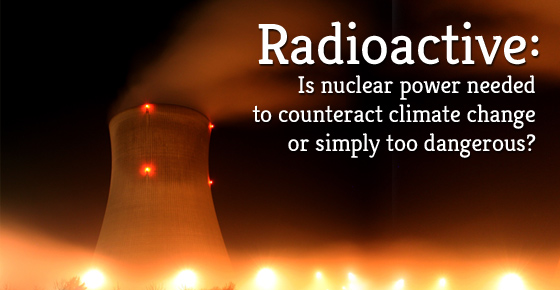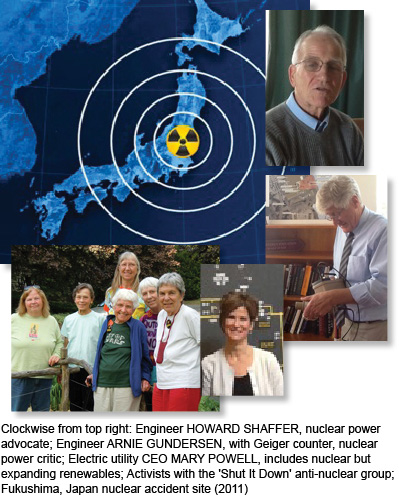Radioactive
Programs 211, 212 • 58 mins
CDs available via special order. HumanMedia ®
Listen to excerpt:
Programs 211, 212 • 58 mins
CDs available via special order. HumanMedia ®
Listen to excerpt:

The energy from one uranium molecule, used to fuel nuclear power, is a million times greater than that from one molecule of coal, commonly used in electricity generation. And because nuclear energy facilities emit less global warming pollution (although they do emit some), a debate has emerged over whether to expand nuclear power to counteract climate change.

Top photo, courtesy Juliues Dillier
Nuclear critics maintain that a history of catastrophic accidents, including the partial meltdown of the Three Mile Island plant in Pennsylvania in 1979, the Chernobyl explosion in Russia in 1986, the Fukushima, Japan accident in 2011, and numerous near-catastrophes, make this technology simply too dangerous. And there’s the unsolved problem of nuclear waste, which remains dangerously radioactive, in some cases for hundreds of thousands of years. In this documentary, we hear nuclear experts pro and con, an emergency room physician, and a variety of voices telling the story of a controversial reactor in Vermont, which is perhaps America’s greenest state.
From 1990 until 2010, I was telling people that we should have renewables, and we shouldn’t have coal or oil, but the bridge technology should be nuclear. If there was not enough renewable energy, we could bridge that gap with nuclear power. And then the [Fukushima] accident happened in 2011.”
—Arnie Gundersen, long-time nuclear power executive, now industry critic
Back in 2008, we launched very publicly a very aggressive strategy around ramping down our dependence on nuclear energy, and ramping up our dependence on renewable energy—but using nuclear strategically in the portfolio to help us keep it low carbon.”
—Mary Powell, CEO of Green Mountain Power, the largest electricity provider in Vermont
It’s just an extraordinarily arrogant thing that we have done. I mean, we’re talking about the need to protect the environment from this [nuclear waste] material for a half a million years. All of recorded human history goes back about six thousand years. And we say we’re going to guarantee the future for a half a million years to come.”
—Ira Helfand, MD